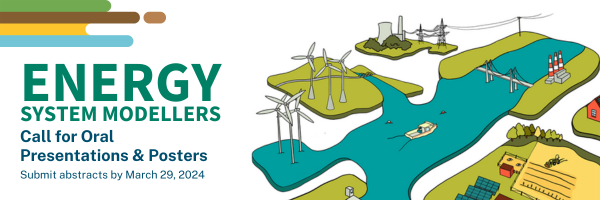The Energy Modelling Hub and Net Zero Atlantic are excited to invite you to participate in the Atlantic Canadian Conference on Energy System Modelling, June 19-20, 2024, in Moncton, N.B. as a presenter.
We are looking for oral presentations and posters from energy system modelling experts that showcase your modelling results and insights related to one or more of the six key topics listed below.
To apply, please submit your abstract via our online form by March 29, 2024 and mention which of the sessions you would like to present. Once we receive your submitted abstracts, the scientific review committee will review and confirm the selected presentations by April 19, 2024.
We look forward to your valuable contributions and insightful presentations during the Atlantic Canadian Conference on Energy System Modelling.
Submit your abstract by March 29, 2024.
Topic 1 - The Future Unveiled: Modelling Deep Changes in Energy Systems
This panel sets the stage for discussing the profound transformations underway in energy systems. It focuses on how energy modelling is uncovering new insights in technology adoption, demographic shifts, and grid resilience, underscoring the need for policymakers to understand these deep changes.
Topic 2 - Scenarios of Uncertainty: Navigating Through Emerging Energy Trends
Dedicated to exploring future scenarios, this panel discusses the challenges and uncertainties in predicting energy trends. It highlights the role of energy models in illuminating these paths and the importance of adaptable and responsive policy frameworks in an evolving energy landscape.
Themes: Impact of Demographic Changes, Integration of Non-Power Sectors, Distributed Energy Resources (DERs) in Atlantic Canada, Distributed Energy Resources (DERs) in Atlantic Canada
Topic 3 - Resilient Grids for Dynamic Future: Addressing Variable and Stability
This panel delves into the technical aspects of ensuring grid resilience amid deep changes, particularly with the integration of variable renewables. It will discuss the importance of short-timescale modelling and how these insights can guide policy decisions for stable energy supply.
Themes: Adoption of New Technologies, Technological Advancements (such as grid modernization and emerging energy technologies), Ensuring Grid Resilience: Short-Timescale Modeling for Stable Power
Topic 4 - Collaborating in Action: Bridging Energy Modelling with Policy Agility
Focusing on the synergy between energy modelling and policymaking, this panel emphasizes the need for collaboration in the face of deep changes. Discussions will center on how government officials can use modelling insights to remain agile and effective in policy formulation and intervention.
Themes: Regulatory Roadmap: Adapting Policies for High Electrification and High Adoption of Variable Renewables, From Winds to Watts: Efficiently Representing Variable Parameters in Energy Models
Topic 5 - Adapting to New Realities: Policy Shifts in the Wake of Technological and Behavioural Changes
This panel will explore how policy needs to adapt to the realities of technological advancements and behavioural changes. It will discuss scenarios like the implications of eliminating a carbon tax and how energy models can inform these significant policy transitions.
Themes: Impact of Demographic Changes, Challenges and Opportunities Presented by Changes in Policy (like life without a carbon tax), Behavioural Change
Topic 6 - From Modelling to Action: Translating Insights into Sustainable Policies
The final panel will bridge the gap between modelling and actionable strategies. It will focus on how insights from energy models can be translated into sustainable and agile policies, ensuring effective responses to the deep changes impacting the energy sector.
Themes: Decarbonization Dilemmas: Affordable Solutions for Atlantic Canada

